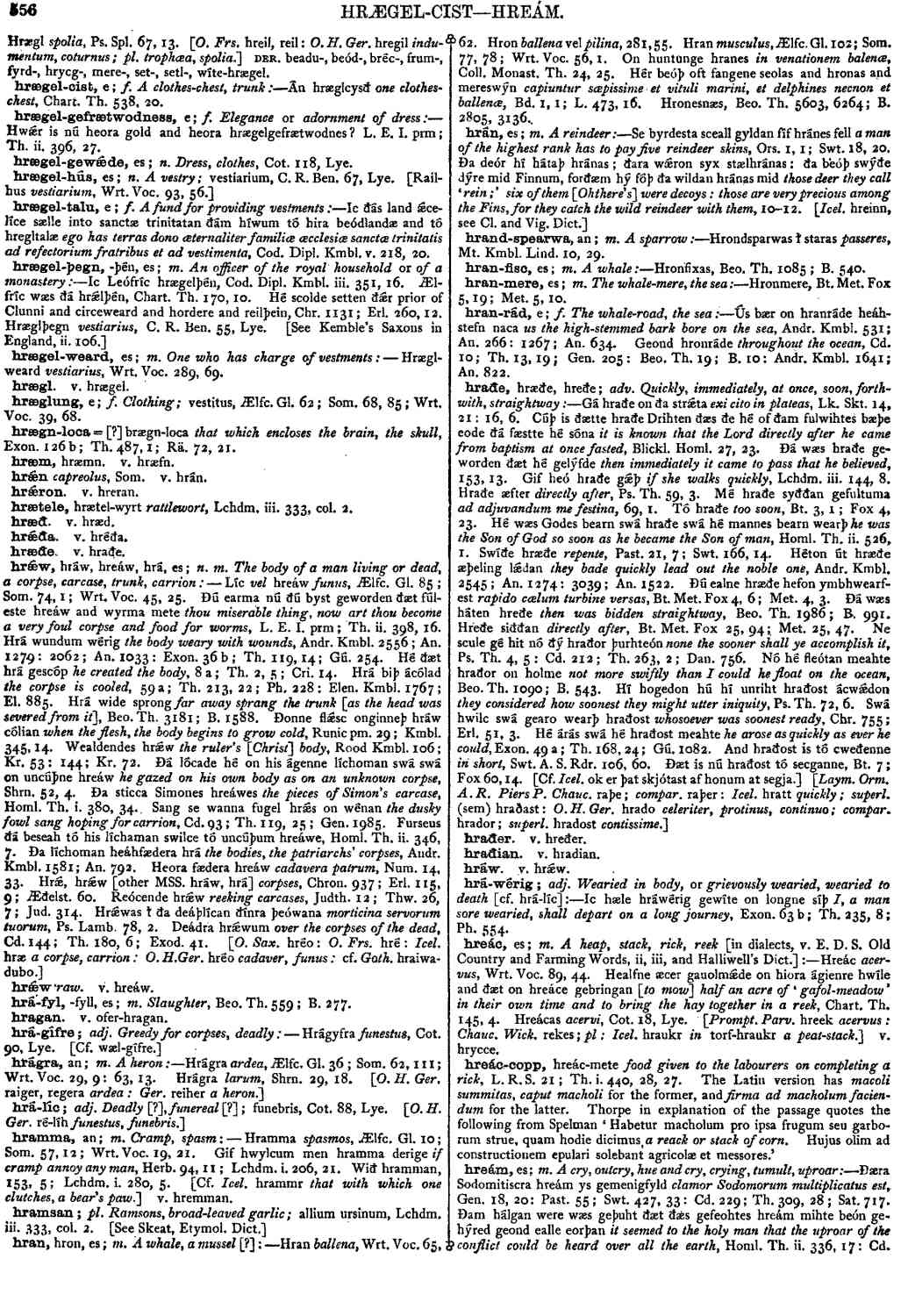hrǽw
- noun [ neuter ]
-
Líc vel hreáw
funus,
- Ælfc. Gl. 85 ;
- Som. 74, 1 ;
- Wrt. Voc. 45, 25.
-
Ðú earma nú ðú byst geworden ðæt fúleste hreáw and wyrma mete
thou miserable thing, now art thou become a very foul corpse and food for worms,
- L. E. I. prm ;
- Th. ii. 398, 16.
-
Hrá wundum wérig
the body weary with wounds,
- Andr. Kmbl. 2556 ;
- An. 1279: 2062 ;
- An. 1033: Exon. 36 b ;
- Th. 119, 14 ;
- Gú. 254.
-
He ðæt hrá gescóp
he created the body,
- 8 a ;
- Th. 2, 5 ;
- Cri. 14.
-
Hrá biþ ácólad
the corpse is cooled,
- 59 a;
- Th. 213, 22;
- Ph. 228: Elen. Kmbl. 1767;
- El. 885.
-
Hrá wide sprong
far away sprang the trunk [as the head was severed from it ],
- Beo. Th. 3181 ;
- B. 1588.
-
Ðonne flǽsc onginneþ hráw cólian
when the flesh, the body begins to grow cold,
- Runic pm. 29 ;
- Kmbl. 345, 14.
-
Wealdendes hrǽw
the ruler's [Christ] body,
- Rood Kmbl. 106 ;
- Kr. 53: 144 ;
- Kr. 72.
-
Ðá lócade hé on his ágenne líchoman swá swá on uncúþne hreáw
he gazed on his own body as on an unknown corpse,
- Shrn. 52, 4.
-
Ða sticca Simones hreáwes
the pieces of Simon's carcase,
- Homl. Th. i. 380, 34.
-
Sang se wanna fugel hrǽs on wénan
the dusky fowl sang hoping for carrion,
- Cd. 93 ;
- Th. 119, 25 ;
- Gen. 1985.
-
Furseus ðá beseah tó his líchaman swilce tó uncúþum hreáwe
.- Homl. Th. ii. 346, 7.
-
Ðá líchoman heáhfædera hrá
the bodies, the patriarchs' corpses,
- Andr. Kmbl. 1581 ;
- An. 792.
-
Heora fædera hreáw
cadavera patrum,
- Num. 14, 33.
-
Hrǽ, hrǽw [other MSS. hráw, hrá]
corpses,
- Chron. 937 ;
- Erl. 115, 9 ;
- Æðelst. 60.
-
Reócende hrǽw
reeking carcases,
- Judth. 12 ;
- Thw. 26, 7 ;
- Jud. 314.
-
Hrǽwas ł ða deáþlícan ðínra þeówana
morticina servorum tuorum,
- Ps. Lamb. 78, 2.
-
Deádra hrǽwum
over the corpses of the dead,
- Cd. 144 ;
- Th. 180, 6 ;
- Exod. 41.
Bosworth, Joseph. “hrǽw.” In An Anglo-Saxon Dictionary Online, edited by Thomas Northcote Toller, Christ Sean, and Ondřej Tichy. Prague: Faculty of Arts, Charles University, 2014. https://bosworthtoller.com/19634.
Checked: 1